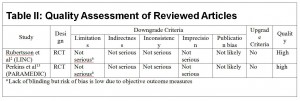Mechanical Compressions Versus Manual Compressions in Cardiac Arrest
ABSTRACT
Background: More than 350 000 people suffer an out of hospital cardiac arrest every year. Even when medical providers have adequate training it can be difficult to carry out an effective resuscitation due to suboptimal CPR, multiple interventions needing to be done simultaneously, and many other less than ideal conditions. What if there was an alternative for compressions during emergency situations that could provide uninterrupted quality CPR and improve provider safety? Many studies have attempted to evaluate the use of mechanical compressions in these situations.
Methods: Exhaustive search of available medical literature including MEDLINE-Ovid, MEDLINE-PubMed, Web of Science, and CINAHL was performed using keywords: “mechanical compressions/LUCAS”, “manual compressions/CPR”, and “prehospital/emergency medical services/out of hospital cardiac arrest.” Studies were screened with eligibility criteria and resulting studies were then assessed for quality with GRADE.
Results: Two studies were included in this systematic review, meeting all inclusion criteria. Rubertsson et al is a RCT that looked at 4471 patients who experienced an out-of-hospital cardiac arrest. It found that mechanical compressions were equivalent to manual compressions when looking at survival rates or neurological status. Perkins et al another RCT looked at survival rates of mechanical vs. manual compressions following an OHCA. Survival rates did not significantly differ between the groups, but favorable neurological outcomes were lower in the LUCAS group when compared to manual compressions.
Conclusion: Mechanical compressions have been shown to provide consistent, effective, more technically sound compressions than manual CPR which may provide a significant advantage during specific scenarios: difficult transport, prolonged resuscitation, and during PCI. Further research in these unique situations needs to be done to establish if the variations in outcomes are due to type of compression or the overarching algorithm implemented.
Keywords: LUCAS/mechanical compressions, out of hospital cardiac arrest/prehospital, manual compressions/CPR
(Click on image to enlarge.)
REVIEWED STUDIES:
Rubertsson S, Lindgren E, Smekal D, et al. Mechanical chest compressions and simultaneous defibrillation vs conventional cardiopulmonary resuscitation in out-of-hospital cardiac arrest: The LINC randomized trial. JAMA. 2014;311(1):53-61. doi: http://dx.doi.org/10.1001/jama.2013.282538.
Perkins GD, Lall R, Quinn T, et al. Mechanical versus manual chest compression for out-of-hospital cardiac arrest (PARAMEDIC): A pragmatic, cluster randomised controlled trial. Lancet. 2015;385(9972):947-955. doi: http://dx.doi.org/10.1016/S0140-6736(14)61886-9.
AUTHOR: Larissa Fritts is currently completing her second year in the School of PA Studies at Pacific University, Oregon. She will graduate with an MS degree in August, 2016.




